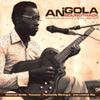"Angola Soundtrack: Special Sounds from Luanda 1965-1978"
 Hopelessly smitten by Buda Musique's long-defunct series of albums devoted to Angola, Analog Africa's Samy Ben Redjeb decided to try to pick up where his predecessors left off.  Characteristically, he quickly discovered that such an endeavor was much more convoluted and challenging than he had ever imagined, but ultimately made it through the gauntlet of denied visas, obligatory bribes, prohibitively expensive hotels, and ill-timed food poisoning to assemble what is possibly his finest compilation to date.
Hopelessly smitten by Buda Musique's long-defunct series of albums devoted to Angola, Analog Africa's Samy Ben Redjeb decided to try to pick up where his predecessors left off.  Characteristically, he quickly discovered that such an endeavor was much more convoluted and challenging than he had ever imagined, but ultimately made it through the gauntlet of denied visas, obligatory bribes, prohibitively expensive hotels, and ill-timed food poisoning to assemble what is possibly his finest compilation to date.
There is something about adversity tends to result in great music, and conditions don't get much adverse than those in Angola during the time of these recordings.  For one thing, the country was the battleground for the Colonial War from 1961 to 1975, as Angolan revolutionaries fought to expel their Portuguese rulers. Then, that finally accomplished, the country immediately plunged into a 27-year long civil war and a whole lot of poverty and social unrest.  Even today, Angola has the world's second lowest life expectancy.  Of course, the arguable silver lining to all that death and misery is that nobody had the time or patience for frivolity, self-indulgence, over-orchestration, over-production, or pretension in their music: these guys were lucky to just be cutting records and tried like hell to make them count.  In fact, hardly anyone even seems to have had access to a horn section: just a guitar, a bass, whatever percussion they could get together, and maybe an occasional organ.  It is unfortunate that these bands were so stripped down out out of sheer necessity, but it is an aesthetic that suits my discerning ears quite well.
Much like many of the other exciting and highly localized music explosions that have been anthologized recently, the prime period for music in Angola coincided with a collision of African and Latin influences.  It also coincided with a strong desire to create a distinct Angolan sound to assert their cultural independence from Portugal.  For the most part, the Latin influence makes itself felt mostly through driving, vibrant percussion and simple, insistent bass lines.  The African elements, on the other hand, manifest themselves most strongly in the clean, intricate guitar lines.  The blending of cultures gets a bit blurrier than just that though, as touches of American surf music and other esoteric surprises occasionally pop-up as well.  Also, there is a definite feel of urgency and melancholy in a lot of these songs, which serves to tone down the Latin percussion to a suitably non-manic pace.
The definite stand-out piece on the album is Quim Manuel's "Eme Lelu," one of the rare times horns make an appearance.  The cool brass parts are just gravy though, as the song's real charm lies in its mesmerizing, sinuous rhythm.  I also loved the tensely repetitive "Mecongo Mi Chiquita," by Ferraro Do Nascimento. There's quite a bit of other strong material here too– nothing that quite floored me, but the hit-to-miss ratio is quite a bit better than it has been on the last few Analog Africa comps.  I think the probable cause is that a lot of these musicians have a solid understanding of understatement and nuance, which is greatly appreciated, as the more hyperactive strains of Latin-African hybrids tend to grate on me.  As do most jubilantly happy, major key songs, which is why I was very surprised to find that the man behind the jaunty "Uma Amiga" (David Zé) was murdered in a wave of repression that followed a failed coup (along with several other influential musicians).  In fact, most of his music is impossible to find even now because people were so frightened to be caught with it during that dark period.  Sometimes, even seemingly innocuous music holds morbid surprises, I guess.
Obviously, the music is the main draw here, but I have definitely fallen completely in love with Analog Africa's packaging: each new album is like the next chapter in the unfolding autobiography of a passionate and compelling eccentric.  There are lots of people out there scavenging the world for great lost music and many of them do an excellent job providing colorful or informative context and liner notes, but only Redjeb makes a point of also explaining exactly why he is excited about each project, recounting the absurd lengths he went to to make it happen, and including as many interviews with the people involved as possible.  I get the feeling that each new release is the most important thing in the world to Redjeb, not just "the next album." For Angola Soundtracks, he even postponed going to the hospital while seriously ill just because people kept stopping by to sell him records; I'm sure someday I will probably read about him braving an alligator attack or navigating a minefield or something just to interview some guy that played maracas on a 45 he likes.  Samy is the music nerd's music nerd– it is impossible to remain unmoved by his enthusiasm.
- Ferreira Do Nascimento, "Mecongo Me Chiquita"
- Quim Manuel O Espirito Santo, "Eme Lulu"
- Alliace Makiadi, "Passeio Por Luanda"
 



